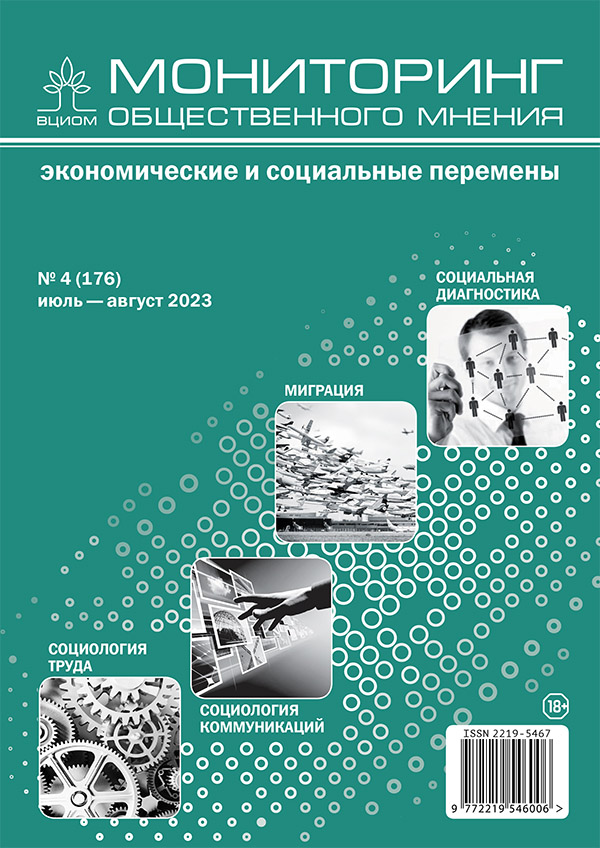Understanding the COVID-19 Pandemic Sociologically. Book Review: Lupton D. (2022) COVID Societies: Theorising the Coronavirus Crisis. Abingdon: Routledge
DOI:
https://doi.org/10.14515/monitoring.2023.4.2393Keywords:
COVID societies, syndemic, pandemic, biopolitics, Deborah LuptonAbstract
The article reviews the book “COVID Societies: Theorising the Coronavirus Crisis” by Deborah Lupton. The author of the book seeks to identify appropriate sociocultural frameworks and concepts to understand the changes provoked by the global spread of the COVID-19 pandemic. The world has changed a lot since January 2020, Lupton notes, and the COVID crisis has “reshaped” all areas of social and daily life. Understanding these new processes calls for a complex analysis which involves examining relevant academic and popular discourse surrounding the pandemic, the macropolitical study, and then, through the late modern social reflection, researching everyday ideas and practices that adapt to new global conditions. Based on this, it is possible to continue studying daily life in relation to the COVID-19 pandemic. Therefore, the author draws on the theories of ‘bare life’ by Agamben and its interpretation by Esposito, Foucault’s concept of biopower, Mbembe’s notion of ‘necropolitics’, Deleuze’s deconstructionism, Beck’s idea of risk society, and Douglas’s ideas of cultural boundaries. Lupton skillfully demonstrates how these approaches can be used to analyze the pandemic, which, in her opinion, allows to analyze the interconnected social, political, and economic contexts of the COVID-19 pandemic based on methodological pluralism.
References
Агамбен Дж. (2011) Homo sacer: Суверенная власть и голая жизнь. М.: Европа.
Agamben G. (2011) Homo Sacer: Sovereign Power and Bare Life. Moscow: Europe Publishing House. (In Russ.)
Бек У. Общество риска: на пути к другому модерну. М.: Прогресс-Традиция, 2000.
Beck U. (2000) Risk Society: Towards a New Modernity. Moscow: Progress-Traditsiya. (In Russ.)
Вершинина И.А., Лядова А.В. (2021) Здоровье и здравоохранение в Европе: между неравенством и новыми возможностями // Социологические исследования. № 6. C. 160—162. https://doi.org/10.31857/S013216250014122-7.
Vershinina I.A., Liadova A. (2021) Health and Health Care in Europe: Between Inequalities and New Opportunities. Sociological Studies. No. 6. P. 160—162. https://doi.org/10.31857/S013216250014122-7. (In Russ.)
Вершинина И.А., Лядова А.В. (2022) Здоровье в цифровом измерении: «концепция заботы» Д. Лаптон // Социологические исследования. № 4. С. 105—113. https://doi.org/10.31857/S013216250014392-4.
Vershinina I. A., Liadova A. V. (2022) Digital Health: Deborah Lupton’s Concept “Thinking with Care”. Sociological Studies. No. 4. P. 105—113. https://doi.org/10.31857/S013216250014392-4. (In Russ.)
Лаптон Д. (2021) Жирные / пер. с англ. под науч. ред. А. Смирнова. М.: Издательский дом Высшей школы экономики. https://doi.org/10.17323/978-5-7598-2320-9.
Lupton D. (2021) Fat. Moscow: HSE Publishing House. https://doi.org/10.17323/978-5-7598-2320-9. (In Russ.)
Костина Е.Ю., Орлова Н.А. (2022) О этот новый старый мир, или Как COVID-19 трансформировал нашу повседневность // Мониторинг общественного мнения: экономические и социальные перемены. № 6. C. 11—36. https://doi.org/10.14515/monitoring.2022.6.2270.
Kostina E.Yu., Orlova N.A. (2022) Old New World, or How COVID-19 Has Transformed Our Everyday Life. Monitoring of Public Opinion: Economic and Social Changes. No. 6. P. 11—36. https://doi.org/10.14515/monitoring.2022.6.2270. (In Russ.)
Davis M., Lohm D. (2020) Pandemics, Publics, and Narrative. New York, NY: Oxford University Press. https://doi.org/10.1093/oso/9780190683764.001.0001.
Douglas M. (1992). Risk and Blame: Essays in Cultural Theory. London: Routledge.
Harvey M. (2021) The Political Economy of Health: Revisiting Its Marxian Origins to Address 21st-Century Health Inequalities. American Journal of Public Health. Vol. 111. No. 2. P. 293—300. https://doi.org/10.2105/ajph.2020.305996.
Lupton D. (2022) COVID Societies: Theorising the Coronavirus Crisis. Abingdon: Routledge.
Mbembe A. (2003) Necropolitics. Public Culture. Vol. 15. No. 1. P. 11—40. https://doi.org/10.1215/08992363-15-1-11.
Sell S.K., Williams O.D. (2020) Health Under Capitalism: A Global Political Economy of Structural Pathogenesis. Review of International Political Economy. Vol. 27. No. 1. P. 1—25. https://doi.org/10.1080/09692290.2019.1659842.
Shilling C. (1993) The Body and Social Theory. London: Sage.
Sontag S. (1990) Illness as Metaphor and AIDS and Its Metaphors. New York, NY: Doubleday; Anchor Books.
Wang S., Chen X., Li Yo., Luu C., Yan R., Madrisotti F. (2021) “I’m More Afraid of Racism than of the Virus!”: Racism Awareness and Resistance among Chinese Migrants and Their Descendants in France during the COVID-19 Pandemic. European Societies. Vol. 23. No. S1. P. 721—742. https://dx.doi.org/10.1080/14616696.2020.1836384.
Downloads
Published
How to Cite
Issue
Section
License
Copyright (c) 2023 Monitoring of Public Opinion: Economic and Social Changes Journal (Public Opinion Monitoring) ISSN 2219-5467

This work is licensed under a Creative Commons Attribution-NonCommercial-ShareAlike 4.0 International License.






